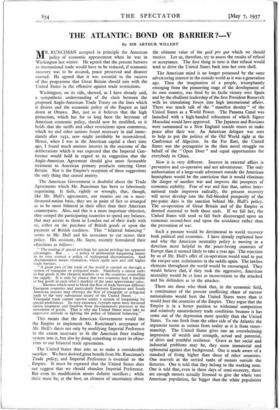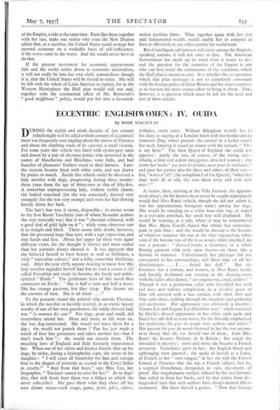THE ATLANTIC: BOND OR BARRIER ? - V
By SIR ARTHUR WILLERT
MR. RUNCIMAN accepted in principle the American policy of economic appeasement when he was in Washington last winter. He agreed that the present barriers to international trade would have to be reduced, if economic recovery was to be assured, peace preserved and disaster averted. He agreed that it was essential to the success of this programme that Great Britain should join with the United States in the offensive against trade restrictions.
Washington, on its side, showed, as I have already said, a sympathetic understanding of the clash between the proposed Anglo-American Trade Treaty on the lines which it desires and the economic policy of the Empire as laid down at Ottawa. But, just as it believes that the high protection, which has for so long been the keystone of American economic policy, should now be modified, so it holds that the tariffs and other restrictions upon commerce, which we and other nations found necessary in and imme- diately after 1932, now might justifiably be reconsidered. Hence, when I was in the American capital a short time ago, I found much anxious interest in the outcome of the deliberations which it was expected that the Imperial Con- ference would hold in regard to its suggestion that the Anglo-American Agreement should give more favourable treatment to American primary products entering Great Britain. Nor is the Empire's reception of these suggestions the only thing that caused anxiety.
The American Government is doubtful about the Trade Agreements which Mr. Runcitnan has been so laboriously negotiating. It feels, rightly or wrongly, that, though, like Mr. Hull's agreements, our treaties are on a most- favoured-nation basis, they are in point of fact so arranged as to be more bilateral in their effect than their American counterparts. Also, and this is a more important objection, they compel the participating countries to spend any balance, that may accrue to them in London out of their trade with us, either on the purchase of British goods or upon the payment of British creditors. This "bilateral balancing" seems to Mr. Hull and his associates to cut across their policy. His assistant, Mr. Sayre, recently formulated their objections as follows :
"The trading of special privilege for special privilege has apparent advantages. But . . . a policy of preferential bargaining means in its very essence a policy of widespread discrimination. And discrimination means retaliation, which spells new and still higher trade barriers. . . .
"A great part of the trade of the world is carried on through a system of triangular or polygonal trade. Manifestly a nation seeks to buy goods in the cheapest markets or in the countries controlling the supply. It is only by chance that two countries find it feasible to buy goods in each other's markets of the same approximate value. . . . Barriers which tend to block the flow of trade between different European countries and particularly between European and South American nations may obstruct the flow of triangular or polygonal trade to the very substantial injury of the United States. . . . Triangular trade cannot survive under a system of bargaining for special preferences. Its very existence eepends upon most favoured nation treatment and freedom from discriminatory practices in the movement of goods. That is why the United States must take an aggressive attitude in fighting the policy of bilateral balancing."
This means that the American Government would like the Empire to implement Mr. Runciman's acceptance of Mr. Hull's thesis not only by modifying Imperial Preference to the extent necessary to fit the American freer trading system into it, but also by doing something to meet its objec- ons to our bilateral trade agreements.
The United States thus asks us to make a considerable sacrifice. We have derived great benefit from Mr. Runciman's Trade policy, and Imperial Preference is essential to the Empire. It must be repeated that the United States does not suggest that we should abandon Imperial Preference. But even its modification means definite sacrifices ; while their must be, at the best, an element of uncertainty about the ultimate value of the quid pro quo which we should receive. Let us, therefore, try to assess the results of refusal or acceptance. The first thing to note is that refusal would tend to drive the United States back into her own shell.
The American mind is no longer possessed by the same adventuring interest in the outside world as it was a generation ago. Then the imagination of a people, triumphantly emerging from the pioneering stage of the development of its own country, was fired by its facile victory over Spain and by the ebullient leadership of the first President Roosevelt with its stimulating forays into high international affairs. There was much talk of the "manifest destiny" of the United States as a World Power. The Panama Canal was launched with a high-handed robustness of which Signor Mussolini would have approved. The Japanese and Russians were summoned to a New England seaside resort to make peace after their war. An American delegate was sent to help to put the politics of the Old World right at the Conference of Algeciras. In the Far East, the United States was the protagonist in the then novel struggle on behalf of the "Open Door" and equal opportunities for everybody in China.
Now it is very different. Interest in external affairs is preventive and co-operative and not adventurous. The only authorisation of a large-scale adventure outside the American hemisphere would be the conviction that it would eliminate the danger of another war and improve the prospects of economic stability. Fear of war and fear that, unless inter- national trade improves radically, the present recovery will never develop into the full-blooded prosperity of the pre-panic days is the sanction behind Mr. Hull's policy. The co-operation of Great Britain and of the Empire is deemed essential to both those ends. If we fail her, the United States will tend to fall back discouraged upon an economic second-best and upon the avoidance rather than the prevention of war.
Such a posture would be detrimental to world recovery both political and economic. I have already explained how and why the American neutrality policy is moving in a direction more helpful to the peace-loving countries of Europe than it seemed likely to take a year ago. The rejection by us of Mr. Hull's offer of co-operation would tend to put the zoo per cent. isolationists in the saddle again. The lawless elements throughout the world would be encouraged. They would believe that, if they took the aggressive, American neutrality would be at least as inconvenient to the attacked and his defenders as to the attacker.
There are those who think that, in the economic field, a continuance of the present conflicting chaos of narrow nationalisms would hurt the United States more than it would hurt the countries of the Empire. They argue that the Empire is in a better position to withstand competition and relatively unsatisfactory trade conditions because it has come out of the depression more quickly than the United States. To one fresh from the other side of the Atlantic the argument seems as remote from reality as it is from states- manship. The United States gives one an overwhelming impression of wealth and strength, actual and potential, of drive and youthful resilience. Grave as her social and industrial problems may be, they seem immaterial and ephemeral against that background. One is made aware of a standard of living higher than those of other countries. One marvels at the serried ranks of motors outside the factories. One is told that they belong to the working men. One is told that, even in these days of semi-recovery, there are enough motors actually licensed to give the whole vast American population, far bigger than the white population of the Empire, a ride at the mine time. Facts like these, together with her size, make one realise why even the New Dealers admit that, at a sacrifice, the United States could arrange her internal economy on a workable basis of self-sufficiency, if the worst came to the worst. And she would never have to do that.
If the present movement for economic appeasement fails and the world settles down to economic nationalism, it will not really be into her own shell, commodious though it is, that the United States will be forced to retire. She will be left with the whole of Latin America to exploit, for in the Western Hemisphere the Hull plan would still run and, together with the sentimental effect of Mr. Roosevelt's "good neighbour" policy, would put her into a favoured- nation position -there. That, together again with her size and fundamental wealth, would enable her to compete at least as effectively as any other country for world trade.
But if intelligent self-interest still exists among the English- speaking nations, it will not come to that. The American Government has made up its mind what it wants to do ; and the question for the countries of the Empire is not who can best stand the continuance of the conditions which the Hull plan is meant to cure. It is whether the co-operation which that plan envisages is not so completely consonant with the foreign policy of Great Britain and her sister countries as to warrant the most serious effort to bring it about. That, however, is a question which must be left for the next and last of these articles.















































 Previous page
Previous page